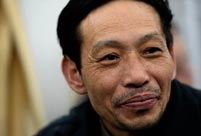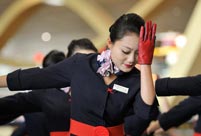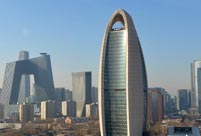 Int'l Snow Sculpture Art Expo in Harbin
Int'l Snow Sculpture Art Expo in Harbin Sichuan money wall for dividend payment
Sichuan money wall for dividend payment Li Na crashes Belinda Bencic in 2nd round at Australian Open
Li Na crashes Belinda Bencic in 2nd round at Australian Open
 Shocking moments when PLA's weapons open fire
Shocking moments when PLA's weapons open fire Famous Lanzhou beef noodles
Famous Lanzhou beef noodles Armed Police hold anti-terrorism drill in SE China's Xiamen
Armed Police hold anti-terrorism drill in SE China's Xiamen Harbin Int'l Ice and Snow Festival opens
Harbin Int'l Ice and Snow Festival opens 'Jin' named the word of the year by cross-strait netizens
'Jin' named the word of the year by cross-strait netizens Chinese scientific expedition goes to build new Antarctica station
Chinese scientific expedition goes to build new Antarctica station
CHONGQING, Jan. 27 -- Farmer Liu Xinglu earns 20,000 yuan(3,278 U.S. dollars) a year renting his farm to an agricultural company. It doubles what he made before 2010 when he tended the plot himself.
Liu, from Jiangjin District, southwest China's Chongqing Municipality, is a farmer and employee of Hengjia Agricultural Development Company, to which he rents six mu of land (0.4 hectare). His earnings include rent fees and a salary from the firm.
Hengjia has rented 227 hectares of land to grow orange and lemon trees, at a cost of more than 50 million yuan (8.2 million U.S.dollars) since 2008 in a modern agricultural park.
Land transfers like that between Liu and Hengjia have increased over the past decade. Tens of millions of farmers have fled to the cities seeking jobs and large-scale farmers are emerging. Private capital from companies like Hengjia is flowing into the agricultural sector.
According to the Chongqing Agricultural Commission, 3.8 billion yuan in capital was invested in a total of 11,000 farming projects in Chongqing from 2008 to 2012.
Nationwide, agricultural investment increased 32.5 percent year on year to reach 924.1 billion yuan in 2013, according to the National Bureau of Statistics. The growth was much higher than the 17.4 percent seen in the secondary sector and 21 percent for the tertiary sector.
As investors discover the industrial value of agriculture, the acceleration of capital flowing into agriculture is inevitable, said Zheng Fengtian, a professor of agricultural and rural development at Renmin University of China.
Industrial and commercial capital can help transform agriculture through information technology, industrial production and management ideas, and tracking systems to ensure the quality and safety of agricultural products.
Some IT sector enterprises have already invested in agriculture.
In August 2012, Legend Holdings, parent company of Lenovo Group, China's leading personal computer maker, founded its subsidiary Joyvio Group for modern agriculture investment and business.
Qingdao Wallen Blueberry & Fruit Co. Ltd., a subsidiary of Joyvio, has invested 250 million yuan in Shandong, Liaoning, Sichuan and Hubei provinces with over 1,000 hectares of cultivation plots. The company handles multiple areas, including seedling propagation, fruit planting and processing.
Another subsidiary of Joyvio, China New Agriculture Technology Co. Ltd., based in Sichuan Province, grows kiwi fruit on nearly 700 hectares of model orchards.
Currently, the scattered agricultural production model makes standardization difficult, which contributes to food safety problems, said Chen Shaopeng, senior vice president of Legend Holdings Ltd. and managing director of Joyvio Group.
Chen said the company will manage the production process and gradually foster partners in industrialized agriculture chains.
Joyvio plans to invest one to two billion yuan in the next five years in building projects, such as a world-class fruit research center, modernized kiwi fruit planting bases and fruit packaging and storage centers, said Chen in an interview with the Chengdu Business Daily in Sichuan last week.
The capital flowing into the countryside could increase farmers' income, give jobs to the few remaining rural laborers, and make use of abandoned farmland, said Liu Jun, vice president of Southwest University of Political Science and Law.
Development of modern agriculture requires the support and participation of industrial and commercial capital, said Agriculture Minister Han Changfu at the end of last year.
For companies that rent land for large-scale farming, entrance and supervision regulations should be drawn as early as possible to impose limits on non-grain production and ban non-agriculture use, he added.
In Jiangjin District, more than 20 companies tried to invest in real estate under the guise of building rural tourist locations, but were refused by local authorities.
By the end of 2012, 1.87 million hectares of arable land had been rented by companies, but in some areas, only six percent of land rented by firms was used for planting crops, said a Ministry of Agriculture official in early 2013.
The Chinese government is prudent about capital investment in the countryside, and is both encouraging and restricting the practice, said Zhang Xiaode, an agriculture professor at the Chinese Academy of Governance.
The first policy document issued by the Chinese government for 2014 said the country is exploring insurance for agricultural land transfers to industrial and commercial enterprises and that "non-agricultural use of farming land is strictly prohibited".
The document stressed domestic grain production, strict observation of a "red line" minimum for the country's arable land, and raising agricultural production capacity to ensure basic self-sufficiency of grain products and food security.
 A 60-hour journey home
A 60-hour journey home Int'l Snow Sculpture Art Expo
Int'l Snow Sculpture Art Expo Highlights of China's air force
Highlights of China's air force Airline crew stage flashmob dance at Kunming airport
Airline crew stage flashmob dance at Kunming airport Top15 countries to retire to in 2014
Top15 countries to retire to in 2014 Hot supermodel's new photo album released
Hot supermodel's new photo album released Asia's heaviest box girder finishes 'rotation' in Wuhan
Asia's heaviest box girder finishes 'rotation' in Wuhan Completed facade of People's Daily new headquarters
Completed facade of People's Daily new headquarters Chinese-branded car passes North America standard safety test for the first time
Chinese-branded car passes North America standard safety test for the first time Li Na beats Bouchard to reach Australian final
Li Na beats Bouchard to reach Australian final  Explore the sources of PM 2.5
Explore the sources of PM 2.5 Highlights of Chinese airborne troops'exercises
Highlights of Chinese airborne troops'exercises  'Living in ice house' competition held in central China
'Living in ice house' competition held in central China  Chinese figure in Oscar nominations
Chinese figure in Oscar nominations  Top ten aerospace events in China 2013
Top ten aerospace events in China 2013Day|Week|Month